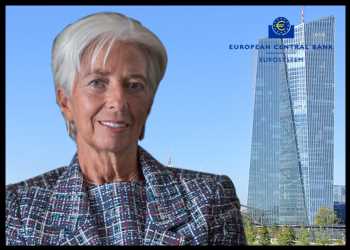European Central Bank President Christine Lagarde said the central bank is determined to bring inflation back to the 2 percent target and reaffirmed that policymakers stand ready to provide liquidity support when needed in the backdrop of the recent financial market turmoil triggered by the banking sector crisis.
“That should not be doubted, the determination remains intact,” Lagarde said in a press conference following the policy decision announcement.
The ECB raised interest rates by 50 basis points earlier on Thursday, in line with the guidance in February. However, the bank did not provide any forward guidance on interest rates.
But Lagarde said the bank still had “a lot more ground to cover” if the baseline persists and that future decisions would be entirely data dependent.
The bank raised interest rates as policymakers expect “inflation to remain too high for too long”.
Markets were closely watching the decision this week as the ECB was the first major central bank to announce its policy decision following the collapse of the California-based Silicon Valley Bank and some other banks in the US over the last weekend.
The SVB collapse also raised concerns whether the central banks were too aggressive in raising interest rates in their battle against runaway inflation.
In Europe, the banking sector concerns worsened after the embattled Credit Suisse, the second biggest bank in Switzerland, approached the Swiss National Bank for support. The lender chose to accept a $54 billion credit line from the SNB late Wednesday.
Some economists were doubtful whether the ECB would indeed raise interest rates by 50 basis points this month, instead opt for a smaller hike of 25 basis points.
Lagarde asserted that there was no trade-off between price stability and financial stability. The ECB chief also said that the latest decisions were taken with a large majority in the Governing Council.
ING economist Carsten Brzeski said the latest decision and communication left the door open to heated debates at the next meetings and with any further rate hike the risk that something breaks increases.
“Therefore, today’s decisions could mark the start of the final phase of the ECB’s tightening cycle: a slowdown in the pace, size and number of any further rate hikes,” Brzeski said.
“We stick to our view that the ECB will hike two more times by 25bp each before the summer and then move to a longer wait-and-see stance.”
The ECB also presented the latest macroeconomic projections for the euro area that saw an upward revision to both growth and inflation forecasts for this year.
The central bank raised the growth projection for this year to 1.0 percent from 0.5 percent seen in December, citing the decline in energy prices and a resilient economy.
However, forecasts for the next two years were lowered to 1.6 percent each from 1.9 percent and 1.8 percent, respectively, owing to the tightening of monetary policy.
Headline inflation projection for this year was lowered to 5.3 percent from 6.3 percent. The outlook for next year was cut to 2.9 percent from 3.4 percent.
The rate is forecast to near the 2 percent target in 2025 with the outlook reduced to 2.1 percent from 2.3 percent.
Meanwhile, the ECB staff raised the core inflation projection for this year to 4.6 percent from 4.2 percent. The core figure, which excludes the volatile food and energy prices, hit a record high of 5.6 percent in February.
Underlying inflation is forecast to ease to 2.5 percent next year and reach 2.2 percent in 2025, due to the fading out of the upward pressures from past supply shocks and the reopening of the economy. The dampening effect of the tighter monetary policy on demand is also expected to help lower the core price pressures.
Lagarde pointed out that the deadline for the ECB staff projections were two weeks before the policy decision, implying that the uncertainty caused by the recent market turmoil was not considered.
Source: Read Full Article

